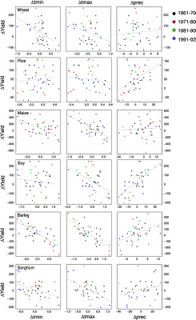Global warming responsible for decline in global crop production - study
 According to a new study by researchers at the Carnegie Institution and Lawrence Livermore National Laboratory, warming global temperatures have already caused annual losses of roughly US$5 billion for major food crops over the past two decades.
According to a new study by researchers at the Carnegie Institution and Lawrence Livermore National Laboratory, warming global temperatures have already caused annual losses of roughly US$5 billion for major food crops over the past two decades.From 1981-2002, warming reduced the combined production of wheat, corn, and barley—cereal grains that form the foundation of much of the world’s diet—by 40 million metric tons per year. The diagram with scatter plots (click to enlarge) shows first-differences of yield (kg ha–1) and first-differences of average monthly minimum and maximum temperatures (°C) and precipitation (mm) during the growing season, along with best-fit trend lines (in grey). Each decade is shown with a different colour, indicating that the relationships do not appear to change through time.
The study, titled "Global scale climate–crop yield relationships and the impacts of recent warming" [*abstract], is published in the current online edition of the journal Environmental Research Letters, and demonstrates that this decline is due to human-caused increases in global temperatures. The article is freely accessible [*.html version / *.pdf version]. Do check it out, as the evidence is represented in a very straightforward way, and it offers a - scaringly clear - signal of the potential disaster climate change has in store for global agriculture.
"Most people tend to think of climate change as something that will impact the future,” says Christopher Field, co-author on the study and director of Carnegie’s Department of Global Ecology in Stanford, Calif. “But this study shows that warming over the past two decades has already had real effects on global food supply."
The study is the first to estimate how much global food production has already been affected by climate change. Field and David Lobell, lead author of the study and a researcher at Lawrence Livermore National Laboratory, compared yield figures from the Food and Agriculture Organization with average temperatures and precipitation in the major growing regions.
They found that, on average, global yields for several of the crops responded negatively to warmer temperatures, with yields dropping by about 3-5 percent for every 1 degree F increase. Average global temperatures increased by about 0.7 degrees F during the study period, with even larger changes in several regions:
 biomass :: bioenergy :: biofuels :: energy :: sustainability :: climate change :: global warming :: agriculture :: crops :: yields ::
biomass :: bioenergy :: biofuels :: energy :: sustainability :: climate change :: global warming :: agriculture :: crops :: yields :: “Though the impacts are relatively small compared to the technological yield gains over the same period, the results demonstrate that negative impacts are already occurring,” said Lobell.
The researchers focused on the six most widely grown crops in the world: wheat, rice, maize (corn), soybeans, barley and sorghum—a genus of about 30 species of grass raised for grain. These crops occupy more than 40 percent of the world’s cropland, and account for at least 55 percent of non-meat calories consumed by humans. They also contribute more than 70 percent of the world’s animal feed.
The main value of this study, the authors said, was that it demonstrates a clear and simple correlation between temperature increases and crop yields at the global scale. However, Field and Lobell also used this information to further investigate the relationship between observed warming trends and agriculture.
"We assumed that farmers have not yet adapted to climate change—for example, by selecting new crop varieties to deal with climate change. If they have been adapting—something that is very difficult to measure—then the effects of warming may have been lower,” explained Lobell.
Most experts believe that adaptation would lag several years behind climate trends, because it can be difficult to distinguish climate trends from natural variability. “A key moving forward is how well cropping systems can adapt to a warmer world. Investments in this area could potentially save billions of dollars and millions of lives,” Lobell added.
More information:
Carnegie Institution: Crops feel the heat as the world warms - March 16, 2007
David B Lobell and Christopher B Field, "Global scale climate–crop yield relationships and the impacts of recent warming", Environ. Res. Lett. 2 (March 2007), 014002, doi:10.1088/1748-9326/2/1/014002
 --------------
--------------


 Energy giants BP and China National Petroleum Corp, the PRC's biggest oil producer, are among the companies that are in talks with Guangxi Xintiande Energy Co about buying a stake in the southern China ethanol producer to expand output. Xintiande Energy currently produces ethanol from cassava.
Energy giants BP and China National Petroleum Corp, the PRC's biggest oil producer, are among the companies that are in talks with Guangxi Xintiande Energy Co about buying a stake in the southern China ethanol producer to expand output. Xintiande Energy currently produces ethanol from cassava.








0 Comments:
Post a Comment
Links to this post:
Create a Link
<< Home